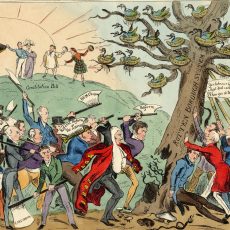
The small town of Mitchell in mid-Cornwall sat on the cross-roads of the main routes between St. Columb and Truro, and Launceston and St. Ives. In 1715, it was described as no more than a ‘small Hamlet, scarce containing thirty Houses’.[1] By the nineteenth century the town had shrunk even further, and only half of its surviving twenty-three houses were inhabited. Correspondingly, the electorate fell from 55 in 1754 to only 7 in 1831, leaving Mitchell as the third smallest constituency in England and consigned to disenfranchisement following the Reform Bill of 1832.
In many respects Mitchell was a quintessential pocket – and sometimes rotten – borough. In the late Stuart period, its archaic franchise left elections entirely in the hands of the lords of the manor, the Roman Catholic Arundell family of Lanherne. However, a sustained assault on this franchise by a body of often-disenfranchised inhabitants led to its replacement by one based on residency in the borough in 1689. Agents for the Arundell family attempted to persist with the traditional franchise during the 1690s, a struggle which is reflected in surviving poll sheets. There were no clear party divisions within the borough, but certain Whig candidates and local Dissenters became associated with the inhabitant-based franchise.
A scot and lot franchise was firmly established in 1701. Thereafter the principal interest in parliamentary elections was held by the portreeve, who served as returning officer. He was chosen out of the five major landowners in the borough known as ‘mesne’ lords. In 1760, Lord Edgcumbe claimed that the inhabitants were ‘in general low, indigent people, [who] will join such of the under Lords from whom they have reason to expect most money and favours’.[2] By 1796, various pieces of property had been sold off, leaving Viscount Falmouth and Sir Christopher Hawkins as the chief patrons of the borough – who tended to sell seats to supporters of the Administration. There were no contests between 1784 and 1831.
[1] Browne Willis, Notitia Parliamentaria: or, An History of the Counties, Cities, and Boroughs in England and Wales (2 vols., London, 1715), ii, 155.
[2] Lewis Namier, The Structure of Politics at the Accession of George III (2nd edn, London, 1978), 304.




